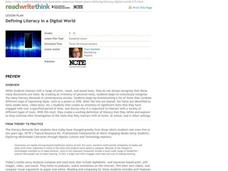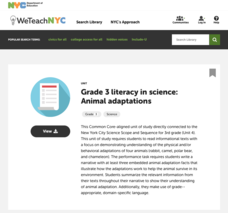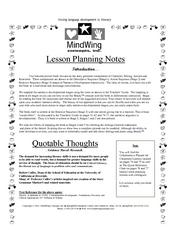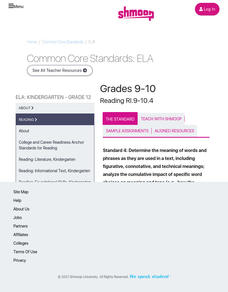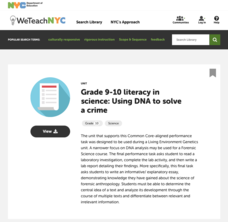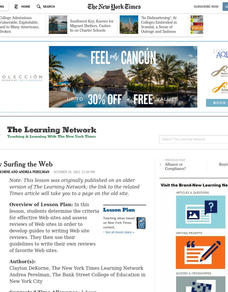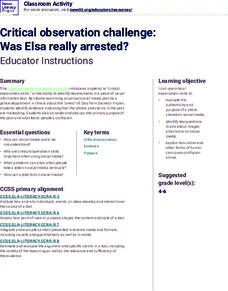ReadWriteThink
Defining Literacy in a Digital World
What skills are necessary to interact with different types of text? Twenty-first century learners live in a digital world and must develop a whole new set of skills to develop media literacy. Class members engage in a series of...
Curated OER
Critical Literacy in the 21st Century
Listen to Sitti's Secrets and have your class discuss their opinions about Arab families. They will become familiar with the Palestinian /Arabic Culture through a critical literacy focus. Students will write a persuasive...
Ontario
Critical Literacy—Media Texts
Media texts convey both overt and implied messages. As part of their study of media, class members analyze the language, form, techniques, and aesthetics in a variety of media texts.
Curated OER
Political Cartoons: Literacy
Readers decode and deconstruct political cartoons to heighten critical thinking, extra-textual literacy, and making meaning from symbolism and metaphor. A compatible activity to use in English class when your 8th or 11th graders are...
New York City Department of Education
Grade 3 Literacy in Science: Animal Adaptations
Third graders research and study animal adaptations and then use their findings to write narratives that include scientific criterion. This lesson is all about literacy and science! The lesson is completely designed for addressing Common...
New York City Department of Education
Grade K Literacy in Social Studies: Thinking About Families
Family is a wonderful subject for little learners to get excited about. Family is also the theme for a social studies unit that uses literacy standards throughout. The guide outlines approximately three weeks of instruction and breaks...
Curated OER
What We Eat, Where We Sleep: Documenting Daily Life to Tell Stories
This is not just a New York Time article to read, this is a set of amazing activity ideas all related to the slide shows "Breaking Bread Everywhere" and "Where Children Sleep." Your class can view each show, read about what they mean...
Crabtree Publishing
Why Does Media Literacy Matter?
Criticism of news and entertainment journalism is at an all-time high. Help 21st-century learners develop the media literacy skills they need to become critical consumers with a three-lesson guide the looks at persuasive techniques used...
Curated OER
Spinelli's Maniac Magee (excerpt): Reading and Critical Thinking Practice
A brief, dialogue-rich passage from Jerry Spinelli's novel Maniac Magee is accompanied by a well-written literacy assessment tool. Thematic content lends itself to age-appropriate discussions about race relations and social justice....
California Department of Education
Workplace Skills
What skills do employers look for in potential employees? Introduce scholars to the skills that pay the bills during the second of six career and college readiness lesson plans. Once they have defined critical 21st-century skills, groups...
Curated OER
The Things That Bothered Farmer Brown
Link language development to literacy skills. This lesson template provides a comprehensible way to use the Braidy Web to maximize language and reading skills. It would be appropriate for developmentally disabled pupils reading at a K-2...
Curated OER
Critical Literacy in the 21st Century
Students discover world geography by writing persuasive letters. In this literacy lesson, students discuss what percentage of children are illiterate in our country compared to other geographic locations. Students utilize writing...
Curated OER
Main Idea in Informational Text
Readers identify main ideas and supporting details using informational texts. In this literacy lesson plan, they make predictions and read the text to find the main ideas. They use a table diagram to define the main idea and supporting...
Curated OER
Understanding the Influence of the Media
Critically analyze advertising techniques, such as circular reasoning, bandwagon, testimonial, and repetition, with worksheets that effectively discuss and illustrate how the media aims to influence.
New York City Department of Education
Grade 3 Literacy: Investigating Sharks
Shark! Scholars read about sharks in Facts about Sharks by Susanna Batchelor. They then pretend they are shark scientists and choose a shark they want to study. Learners research their sharks and record information in graphic organizers...
Shmoop
ELA.CCSS.ELA-Literacy.RI.9-10.4
Your pupils will be expected to determine the meaning of words and how those words affect the meaning of a text. Help them master this skill with the ideas listed here. First, look over the two activities that could be used for your...
New York City Department of Education
Grade 9-10 Literacy in Science: Using DNA to Solve a Crime
Scholars become detectives and use science to solve a crime! A complete unit introduces DNA and includes hands-on activities that have learners model DNA and extract it from different food types. A culminating activity challenges...
Facing History and Ourselves
Social Media and Ferguson
How can social media help or hinder civil dialogue? How can information shared on social media be verified? As the investigation of media reports of the events surrounding the shooting of Michael Brown continues, class members read...
Curated OER
Eastside Literacy Reading Lesson - Fact or Opinion
Analyze critical thinking skills that involve the ability to distinguish between fact and opinion through self-reflection. Higher education students will collect a newspaper article, advertisement, magazine article, tabloid article,...
Media Smarts
Facing TV Violence: Consequences and Media Violence
Make your class aware of the difference between media violence and real violence. Using prior knowledge, a video clip, and a worksheet, class members explore and discuss the unrealistic portrayal of violence in the media. Learners...
Curated OER
Critically Surfing the Web
The New York Times article “Online Diary,” launches this study of websites and how to assess them. Richly detailed, the lesson includes warm-up activities, procedures, journal prompts, discussion questions, and links to valuable...
News Literacy Project
Critical Observation Challenge: Was Elsa Really Arrested?
A 14-slide presentation showcases a social media post featuring Disney's Elsa from the movie, Frozen. The seemingly harmless post received lots of attention, raising the question, how do we know posts are factual? Scholars go through...
Social Media Toolbox
Social Media Plan
It's gameplan time! Journalism scholars create a social media plan based upon work completed in previous lessons. The activity, fifth in a 16-part Social Media Toolbox series, focuses on using data and consensus to create an effective...
Social Media Toolbox
Reporting with Social Media
What does it take to create news stories that are both informative and objective? Aspiring journalists walk the line between engagement and activism with lesson 15 of a 16-part series titled The Social Media Toolbox. Grouped pupils...
Other popular searches
- Critical Media Literacy
- Critical Literacy English
- Magazines Critical Literacy
- Poetry Critical Literacy
- Critical Visual Literacy
- Identity Critical Literacy
- Critical Media Literacy Math
- Critical Pedagogy Media
- Critical Media
- Critical Literacy Lesson Plans


